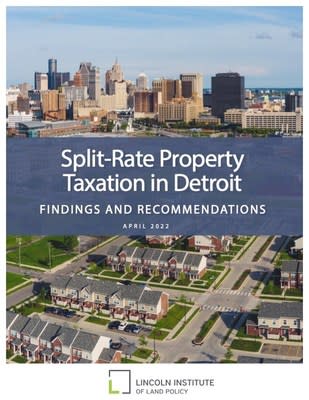Taxing Land More Than Buildings Would Help Detroit Homeowners and Spur Development
[ad_1]
CAMBRIDGE, Mass., April 4, 2022 /PRNewswire/ — Reforming Detroit’s home tax program by taxing land at a higher rate than properties would assist to revive the neighborhood economic system and reduce tax expenses for virtually each and every property owner, in accordance to a new study from the nonprofit Lincoln Institute of Land Plan.
With the cheapest property values of any significant U.S. town and some of the maximum home tax rates, Detroit is caught in a decades-prolonged cycle of increasing tax prices that continue to fail to produce adequate earnings. In the absence of powerful public expert services, higher residence taxes increase operator charges, lower assets values, and enhance the expenditures of mend and redevelopment, making a drag on financial restoration.
Like lots of economically distressed metropolitan areas, the town copes with this obstacle by offering generous tax abatements for new enhancement and for some house owners. Abatements reduce extra prices and briefly elevate house values, but they can only be offered to a modest established of residents and new organizations. This leaves high—sometimes destabilizing—tax bills in area for extended-expression owners. Whilst high taxes remain on most households and companies, inclusive and long lasting incentives for reinvestment are absent.
A better tax fee for land than for structures—known as “break up-fee” mainly because there are two various tax rates—would tackle the difficulty much more correctly and distribute the gains additional equitably.
The new review, Split-Charge Property Taxation in Detroit: Findings and Recommendations, finds that taxing land at five occasions the fee for structures would consequence in decrease tax charges for 96 percent of owners, with an ordinary savings of about 18 %. Beneath a income neutral reform, tax financial savings would be thoroughly offset by tax increases on vacant and underutilized home.
“By adopting a break up-rate assets tax, Detroit can make its tax procedure both more successful and far more equitable,” claimed John Anderson, an economist at the College of Nebraska, Lincoln, and lead creator of the research. “Efficiency is increased by eradicating the tax-linked obstacles to capital advancements and progress. Fairness is enhanced by a reduction in taxes for the vast bulk of residential householders.”
“Splitting the property tax provides extensive-time Detroiters with the tax reduction that new enterprises and residents previously acquire,” said co-creator Nick Allen, former manager of system and coverage for the Detroit Financial Expansion Corporation and now a doctoral prospect at the Massachusetts Institute of Technological innovation. “Our review exhibits that it is an effective, instant way to forever lessen burdens on overtaxed homes and restore home prosperity. It can be not ample, but it is a demanded stage toward racially equitable recovery.”
In addition, a break up-level tax raises the cost of holding vacant land and lessens the expense of establishing it, or of renovating deteriorated buildings. Lessened tax burdens and accelerated expense lead to an normal increase of 12 p.c in the benefit of household home and an enhance of 20 p.c for professional home. In a supporting complex paper, the challenge workforce also located that the proposed 18 p.c reduction in residential taxes would reduce residential tax foreclosures by at least 9 percent.
“Implementation of a break up-rate tax in Detroit gives an prospect to reinforce the home tax method by expanding performance, and minimizing home tax inequities and tax foreclosure,” explained Michigan Condition College economist Mark Skidmore, a co-creator of the analyze.
Commissioned by Devote Detroit with help from The Kresge Foundation, the research analyzes information from municipalities in Pennsylvania that have executed spit-level taxes, as properly as true estate and assets tax data from Detroit. In addition to Anderson, Allen, and Skidmore, the study’s co-authors include Fernanda Alfaro of Michigan Point out College, Andrew Hanson of the College of Illinois at Chicago, Zackary Hawley of Texas Christian College, Dusan Paredes of Northern Catholic University in Chile, and Zhou Yang of Robert Morris University.
“If we are to continue on the momentum of Detroit’s beneficial, equitable expansion, we ought to remodel our residence tax composition to reduce the stress on bulk Black home owners and nearby developers,” reported Dave Blaszkiewicz, president and CEO of Make investments Detroit. “This report supplies a alternative that accomplishes that when also disincentivizing blighted and underutilized homes that hinder Detroit’s advancement.”
“With this investigation, Commit Detroit has elevated an equitable technique to taxation that can convey considerably-desired aid to tax-burdened Detroiters even though encouraging expense and expansion. This is a timely strategy that addresses an urgent concern, and the highly regarded Lincoln Institute of Land Plan has now delivered a reliable framework for local community discussions,” said Wendy Lewis Jackson, managing director of Kresge’s Detroit System.
The crew also created 3 technical papers to guidance the analyze: “Evaluation of Assets Tax Reductions on Tax Delinquency, Tax Foreclosure, and House Ownership,” “Break up-Amount Taxation and Small business Institution Site Evidence from the Pennsylvania Encounter,” and “Split-Rate Taxation: Impacts on Tax Foundation,” all revealed by the Lincoln Institute.
The study is available for obtain on the Lincoln Institute’s site: https://www.lincolninst.edu/publications/other/break up-rate-assets-taxation-in-detroit
The Lincoln Institute of Land Policy seeks to strengthen high-quality of life via the powerful use, taxation, and stewardship of land. A nonprofit private working basis whose origins day to 1946, the Lincoln Institute researches and suggests innovative methods to land as a remedy to economic, social, and environmental difficulties. By means of education and learning, training, publications, and activities, we combine theory and observe to advise public coverage decisions worldwide.

See original content to obtain multimedia:https://www.prnewswire.com/news-releases/new-report-taxing-land-far more-than-properties-would-aid-detroit-homeowners-and-spur-growth-301516877.html
Source Lincoln Institute of Land Plan
[ad_2]
Supply hyperlink







